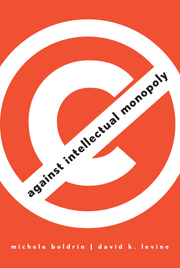Book contents
- Frontmatter
- Contents
- Acknowledgments
- 1 Introduction
- 2 Creation under Competition
- 3 Innovation under Competition
- 4 The Evil of Intellectual Monopoly
- 5 The Devil in Disney
- 6 How Competition Works
- 7 Defenses of Intellectual Monopoly
- 8 Does Intellectual Monopoly Increase Innovation?
- 9 The Pharmaceutical Industry
- 10 The Bad, the Good, and the Ugly
- References
- Index
- Plate Section
6 - How Competition Works
Published online by Cambridge University Press: 30 July 2009
- Frontmatter
- Contents
- Acknowledgments
- 1 Introduction
- 2 Creation under Competition
- 3 Innovation under Competition
- 4 The Evil of Intellectual Monopoly
- 5 The Devil in Disney
- 6 How Competition Works
- 7 Defenses of Intellectual Monopoly
- 8 Does Intellectual Monopoly Increase Innovation?
- 9 The Pharmaceutical Industry
- 10 The Bad, the Good, and the Ugly
- References
- Index
- Plate Section
Summary
Property is a good thing. Ownership of houses, land, automobiles, potatoes, and coffee contributes to our wealth and well-being. Property brings with it rights: you cannot take my property without my permission, but I may, if I wish, sell it to you. This provides incentives to produce, accumulate, and trade. In countries such as Zimbabwe, where property can be arbitrarily taken away by government action and theft, there is little reason to produce or acquire valuable property, which results in widespread poverty and even famine. Without the ability to sell our property, there is little reason to specialize in the production of goods and services, and no mutually beneficial trades are possible.
If property is good for automobiles and potatoes, should it not also be true, as Michael Novak argues, of ideas as well? Intellectual monopoly supporters such as Novak have found it convenient to assert that there is a connection between “intellectual property” as enshrined in copyright and patent law and property rights in the ordinary sense. Property in the ordinary sense is a good thing – and this is as true of ideas as of automobiles and potatoes. Ordinary property of a piece of land enables the owner to improve and sell it for a profit. Owning a piece of land is not equivalent to controlling all pieces of land: plenty other people also own land, which carries the right to improve it without asking for permission.
- Type
- Chapter
- Information
- Against Intellectual Monopoly , pp. 123 - 148Publisher: Cambridge University PressPrint publication year: 2008
- 1
- Cited by

